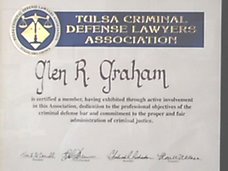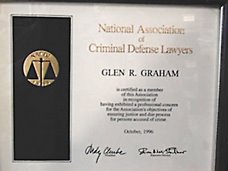What is the correct answer on the matter?
Is a fine for misd. poss. marij. authorized on not?
The easy answer is to call it a court fund assessment which is authorized instead of a fine.
Some lawyers in counties like Oklahoma County, Payne County, and Garfield County, have told me that in their court's the Judge does not imposes a "fine" on a misdemeanor possession of marijuana case but instead imposes court fund assessment and victime crime fund assessments.
The below unpublished OCCA case says no fines authorized for misdemeanor possession of marijuana and reversed the fine ordered. What is the current status of the law in the matter? Statute amended or people interpreting the statute different from this opinion?
Ronald Roger Phipps v. State of Oklahoma, Unpublished, OCCA, No. F-2000-796, (June 20, 2001).
http://www.state.ok.us/~oids/coca/PhippsRR.pdf
Vacated a $1000 dollar fine for possession of marijuana misdemeanor on the grounds that 63 O.S. Sec. 2-402 (B) (2), does not authorize a fine. Held that 21 O.S. Sec. 64 (A) generally cannot replace, or be combined with, specific punishment provisions in other titles of the Oklahoma Statutes. See 21 O.S. Sec. 11 (A); and Gaines v. State, 1977 OK CR 2459, 568 P.2d 1290 (error to combine fine provisions of the Controlled Substances Act with incarceration range in 21 O.S. Sec. 51); Brown v. State, 1976 OK CR 48, 546 P.2d 1023 (catch-all punishment provision in Title 47 controlled over catch-all provision in title 21).
The "catch-all" punishment provision (jail and fine) found in 63 O.S. Sec. 2-411 is inapplicable, as it only applies when an offense in the Uniform Controlled Substances Act provides for no punishment whatsoever. The provision here designates a specific punishment; it simply does not include a fine. The Court cannot ignore the plain meaning of a statute, or add language that is clearly not intended to be there. Arnold v. State, 48 Ok.Cr. 452, 132 P. 1123 (1913), overruled on other grounds, Lenzy v. State, 1993 OK CR 53, 864 P.2d 847.
Does anyone know the correct answer to this question [above] about whether "fines" are "authorized" pursuant to statute in a misdemeanor possession of marijuana case ---- or should it be called a "court fund assessment" instead of a fine?
Lastly, would the counties that have levied possibly "illegal" fines on misdemeanor possession of marijuana cases be required to refund the monies to the defendant's upon proper application?
Is this a possible class action law suit where a smart lawyer could make some money and get some great publicity and free advertising if successful or even if not successful???
Furthermore, if the municipalities cannot impose greater penalties that the state courts, would municipalities be required to issue refunds for fines imposed on misdemeanor possession of marijuana cases if the state statute is held or interpreted as not authorizing fines for that offense???
What about all of the lawyers who incorrectly along with Judges and prosecutors, told their clients the incorrect penalty ranges, would that provide the possibility of withdrawing the plea or setting aside the conviction and therefore make all the felony 2nd offense possession of marijuana cases possible reductions to misdemeanors?
There is a general statute for fines when not addressed in the statute concerning the crimes. But, as pointed out in the above case there is a title 63 --- general statute also, so the general statute arguably would not apply to a drug offense under title 63 since there is a more specific general statute under title 63 for title 63 offenses.
The general statute for title 21 is:
http://www.oscn.net/applications/oscn/DeliverDocument.asp?CiteID=68982
However, see:
http://tinyurl.com/2ht99c
Re: Mitchell v. State case cited below see the below link:
http://www.oscn.net/applications/oscn/deliverdocument.asp?citeid=6530
Mitchell v. State, 1987 OK CR 13, 733 P.2d 412, on rehearing held stuck the fine. (For the rehearing portion of the case see the bottom of the case in the above link)
On rehearing:
¶2 In the petition, petitioner asserts that her sentence should be modified since [733 P.2d 416] 21 O.S. 1981 § 51 [21-51] does not provide for a fine. See Gaines v. State, 568 P.2d 1290 (Okl.Cr. 1977). We agree with this contention, and find that the judgment and sentence should be modified to a term of twenty (20) years imprisonment. As modified, the judgment and sentence is affirmed.
--------------------------------------------------------------------------
Gaines v. State, 1977 OK CR 259, 568 P.2d 1290, held in striking the fine in a possession of cds case:
¶16 This instruction apparently combines the imprisonment which may be assessed under the second and subsequent offenses statute, 21 O.S. 1971 § 51 [21-51], with the fine which may be imposed under the Uniform Controlled Dangerous Substances Act, 63 O.S.Supp. 1975 § 2-401 [63-2-401]. Punishment may not be assessed by combining statutes, but must fall within the limitations of one statute only.
¶17 This Court held in Hayes v. State, Okl.Cr., 550 P.2d 1344 (1976), that when the predicate felony is one not covered under the Uniform Controlled Substances Act, punishment is to be enhanced pursuant to the provisions of the general habitual felon statute, 21 O.S. 1971 § 51 [21-51]. The fine assessed in this case does not fall within the statutory limits of Section 51, which provides for punishment by imprisonment in the penitentiary for a term not less than ten (10) years. For the above reasons judgment and sentence must be modified to a term of fifty (50) years' imprisonment
Unpublished case says fines not authorized on misdemeanor possession of marijuana cases
Posted by
Unknown
0
comments
![]()
Alterantive Sentencing and Community Sentencing Proving Successful In Oklahoma
http://www.doc.state.ok.us/newsroom/releases/Community%20Sentencing%20Program%20Proving%20Successful.pdf
STATE OF OKLAHOMA
OKLAHOMA DEPARTMENT OF CORRECTIONS
3400 Martin Luther King Avenue ♦ Oklahoma City, Oklahoma 73111 ♦
Phone: (405) 425-2513 ♦ FAX: (405) 425-2502
JUSTIN JONES DIRECTOR BRAD HENRY GOVERNOR
NEWS RELEASE For immediate release Contact: Jerry Massie
August 22, 2007 (405) 425-2520
Community Sentencing Program Proving Successful
According to the Oklahoma Community Sentencing Act Annual Report for Fiscal Year 2006, 88% of participating offenders who successfully completed the program prior to July 1, 2003, remained in the community as of June 30, 2006. Only 12% had been received as an inmate of the Oklahoma Department of Corrections. Recidivism studies in corrections most often identify as a recidivist, an offender who is incarcerated within three years of his release from probation supervision or from prison. Of the 10,355 offenders who have received a community sentence since the program began in March, 2000, 21% failed and were sent to prison.
The average cost for fiscal year 2006, per offender was $1,711.00. There were 36 funded community sentencing councils encompassing 61 participating counties. The success rate, one of the best for diversion programs in Oklahoma, demonstrates that Community Sentencing is a proven investment in public safety.
Oklahoma Prisons at 98% capacity according to Director Justin Jones, see article below (emphasis added):
Seeking solutions to Oklahoma's prison problems
August -- 2007
This AP article (see http://newsok.com/article/3104500 ) from Oklahoma provides more details on Oklahoma's prison overcrowding problems (basics here) .
Oklahoma Department of Corrections Director Justin Jones recently said inmate overcrowding had hit 98 percent capacity and is probably at the most critical point in three decades because of a lack of options to deal with the problem. He said his only alternative soon will be to back up state inmates in county jails. Henry said it was premature to consider a special session of the Legislature on the issue, while praising the timing of an Associated Press series of articles on overcrowding and prison problems. "If we don't do something, we will hit that brick wall," he said.
Senate Co-President Pro Tem Glenn Coffee, R-Oklahoma City, has opposed prison expansion, while suggesting more utilization of private prisons. Henry said he agreed with Jones that the state should not become too dependent on private prisons and recommends more prison alternative programs.
Posted by
Unknown
0
comments
![]()
DOMINION AND CONTROL DEFENSES TO DRUG CHARGES
DOMINION AND CONTROL DEFENSES TO DRUG CHARGES
by Glen R. Graham, Attorney at Law, Tulsa, Oklahoma
Web Page: http://www.glenrgraham.com/
Here are some ideas. On many criminal drug cases, there is a question of dominion and control. Who has the right to control the disposition of the drugs? Three people are riding in a car and drugs are found under the seat of one person, but not in plain view. Assuming no one confesses, then this is a classic "dominion and control" question. Sometimes, the police will arrest everyone and then later charges will only be filed against the owner of the vehicle. At other times, the police will say, "we will let the others go, if the person who's drugs it is will admit it was theirs." Sometimes, the police arrest the person making "furtive" movements and say he or she was trying to hide the drugs in the vehicle.
Each case is different and this is both a question of law and a question of fact. Dominion and Control is one of those areas of the law that is not always a clear cut answer.
One time a guy bought a used car from an individual and was pulled over by the police and they found drugs somewhere in the vehicle and charged him with possession of a controlled drug. This person had no serious criminal record and at a jury trial, he was found not guilty. Some Judges will say that dominion and control is a jury question and some Judges will says it is a mixed question of law and fact and may sustain a motion to quash the bind-over, if the parties stipulate to the facts, or sometimes stipulate to the preliminary hearing transcript, waive jury, try the case instanter based upon the preliminary hearing transcript, and sustain the motion to quash and dismiss based upon dominion and control. Other Judges will say it is a jury question and say you can try to work a deal with the prosecutor or try the case to a jury.
I have noticed that even really smart people can disagree upon the facts and the law and the interpretation of the law, for instance, many of the U.S. Supreme Court decisions are split decisions, 5-4 decision, or 6-3, etc. If even our U.S. Supreme Court Judges cannot or do not agree upon the application of the law to the facts or the interpretation of the law, then it should be no suprise that ordinary citizens, police officers, prosecutors, defense lawyers, and Judges, do not always agree.
Posted by
Unknown
0
comments
![]()
Top Secrets in Hiring a Criminal Defense Lawyer
The Top Secrets in Hiring a Criminal Defense Lawyer
By Glen R. Graham, Attorney at Law, Tulsa, OK http://www.glenrgraham.com/
Phone: (918) 583-4621
1. At the initial consultation, your criminal defense lawyer is likely to tell you what you want to hear. "I believe in your innocence." This may very well be lip service to get you to hand over that check. Once the check is cashed, don't be surprised if your criminal defense lawyer starts singing a different tune. You should be aware that the amount of the fee, and the amount that you actually pay (and not promise to pay), ultimately, determines how much time the lawyer spends on the case. A oral fee contract is insufficient protection and how can you be sure of the fee or the price of a jury trial when the lawyer does not put it in writing. You should insist on a written agreement and if he will not give you one, you should shop around for another lawyer.
2. You generally get what you pay for and if you want the lawyer to really fight then you will have to pay an adequate fee to do it. If the lawyer quotes a suspiciously cheap fee, then don't be shocked after he cashes your check if he suddenly starts talking about a plea bargain deal to get the case over and done with. If you want a lawyer to really fight the case, you will have to pay adequate monies for it.
3. Few criminal defense lawyers have the confidence and experience to actually take a case to jury trial and win. Few lawyers actually anticipate going to jury trial so they don't tell you I am going to plead you out and not go to trial in your case. They know or fear that you would hire another lawyer if they told you this or they may really believe that you should plead out without discussing this with you. Asking a few questions, like when was your last jury trial and do you go to trial on many cases, will usually give you more specific knowledge about the lawyer. A lawyer that quotes too low a fee cannot afford to go to a jury trial and he may plan on withdrawing from your case later on once he determines that you will not accept a plea bargain or cannot afford to pay him for a jury trial. The lawyer may avoid quoting you the fee for a jury trial because he does not intend on going to a jury trial in your case.
4. You need a lawyer who is confident, attentive, and willing to work to win your case. If the lawyer you are talking to will not look you in the eye and fails to firmly shake your hand, you might want to shop around some more.
5. The worst thing is a criminal defense lawyer talking a client into a plea bargain deal when it is not in the clients' best interest. You do not want to accept any deals just because the lawyer has not been paid enough monies to fight your case. If only the lawyer had told you this to begin with, you could have borrowed the money or asked your family to help you. But, you didn’t ask enough questions and you assumed the lawyer would work hard for the amount you paid. Remember, you usually get what you pay for and if you don’t pay enough to fight the case then don’t be surprised by the result.
6. *TRUST* - The most important factor in hiring any lawyer is to hire a lawyer that you trust. Trust is not something you can exactly define or explain. Trust is more of a feeling that comes from deep down in the gut. It is something that comes from talking to the lawyer and looking him in the eye.
7. A former prosecutor may or may not be a good choice. A former prosecutor has spent time depersonalizing defendants and incarcerating them. However, it is possible for a former prosecutor to become an advocate for the defendant even if his heart is still that of a former prosecutor. It really just depends on the individual. But, just because the lawyer is a former prosecutor is not a reason to hire him. It is always going to be a question of "trust."
8. A referral from a bondsman to use a certain lawyer is not always a good thing. Sometimes the bondsman just wants the case over with quickly so they can write another bond and they may send you to a lawyer who will dispose of the case too quickly. Sometimes the bondsman may send you to a lawyer that they trust and know will instill confidence in you to show up for court and that has a good reputation for that area of the law.
9. Do weathly people accused of crimes hire the least expensive lawyers and/or former prosecutors to represent them. Most do not. Would "O.J. Simpson" have gotten the same result with a poor man's lawyer as he did with the "dream team" ?
You usually get about what you pay for and the more you pay, the harder the lawyer will work on your case. It sounds like common sense. This is not to say that a good lawyer will not work hard even when he has not been paid but the more you pay a person the more incentive there is to work hard. Everyone has bills to pay and to be able to pay your bills, you must get paid. Most people understand the rate of pay does affect the quality of the work.
Posted by
Unknown
1 comments
![]()





